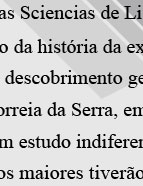

................................
When writing some commemorative works in 1898 on the discovery of the sea route to India, I was convinced that the history of Portugal's maritime undertakings was yet to be written (Fonseca, F., A Descoberta do Brasil [The Discovery of Brazil], 1908)”. This was not just about knowledge and glorification for domestic consumption. It was important to show and make clear that Portugal was at the forefront of the discovery enterprise and that the role played by the Portuguese in the world had to be highlighted. It was therefore also a work of patriotism. This is how the republican, politician, writer, and journalist Faustino da Fonseca understood it. He was part of Pedro Álvares Cabral's voyage in the peninsular expeditions to discover the American continent.
It was necessary to frame the discoveries in order to understand and explain them in the absence of a work of reference to ground all these events. Both Fortunato de Almeida and Faustino da Fonseca paid far less attention to what was known about geographical discoveries and a historical framework than Latino Coelho. The latter, more cultured and more concerned with finding explanations for the discoveries, also tried to frame what was known to have happened in Portugal within the European context. However, there was still no work of synthesis illustrating the 15th and 16th century discoveries. This was a gap pinpointed by many.
The centenary of the discovery of America by Christopher Columbus in 1892 was also deemed important for historical knowledge in Portugal, thus leading to the publication of Alguns documentos do Archivo Nacional da Torre do Tombo acerca das navegações e conquistas portuguezas... [Some documents from the Torre do Tombo National Archives on the Portuguese navigations and conquests...], among other works, since it was considered impossible to dissociate the study of Portuguese expansion from Castilian expansion. In 1904, a physician and geography and history teacher at the Liceu de Lisboa [Lisbon High School] published Historia da Geographia. A epopeia geographica dos Portuguezes durante os séculos XV e XVI. [History of Geography. The geographic epic of the Portuguese in the 15th and 16th centuries]. This was a somewhat limited attempt that clearly highlights the need to begin with the geographical knowledge of the ancient peoples, moving on to medieval times and the adventures of Marco Polo to arrive at Prince Henry the Navigator, and then the sea route to India, and even following Fernão de Magalhães (Acácio Guimarães, Historia da Geographia [History of Geography], 1904).
